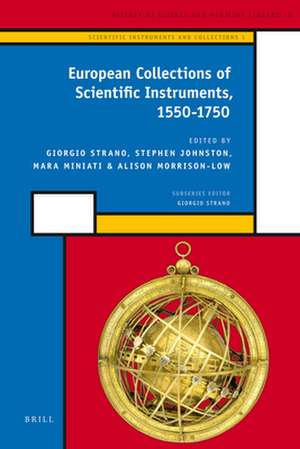European Collections of Scientific Instruments, 1550-1750: Scientific Instruments and Collections, cartea 1
Giorgio Strano, Stephen Johnston, Mara Miniati, Alison D. Morrison-Lowen Limba Engleză Hardback – 25 ian 2009
Contributors include: Paolo Brenni, Filippo Camerota, Gloria Clifton, Wolfram Dolz, Sven Dupré, Karsten Gaulke, Sven Hauschke, Michael Korey, Mara Miniati, Tatiana M. Moisseeva, Peter Plaßmeyer, Klaus Schillinger, Giorgio Strano, Koenraad Van Cleempoel, and Ewa Wyka.
Scientific Instruments and Collections, 1
Preț: 716.43 lei
Preț vechi: 873.68 lei
-18% Nou
Puncte Express: 1075
Preț estimativ în valută:
137.11€ • 142.77$ • 115.87£
137.11€ • 142.77$ • 115.87£
Carte indisponibilă temporar
Doresc să fiu notificat când acest titlu va fi disponibil:
Se trimite...
Preluare comenzi: 021 569.72.76
Specificații
ISBN-13: 9789004172708
ISBN-10: 900417270X
Pagini: 218
Dimensiuni: 160 x 240 x 20 mm
Greutate: 0.59 kg
Editura: Brill
Colecția Brill
Seria Scientific Instruments and Collections
ISBN-10: 900417270X
Pagini: 218
Dimensiuni: 160 x 240 x 20 mm
Greutate: 0.59 kg
Editura: Brill
Colecția Brill
Seria Scientific Instruments and Collections
Cuprins
List of Illustrations
Notes on Contributors
Presentation, Paolo Brenni
Introduction, Giorgio Strano
1. The Mathematical Instruments of Wenzel Jamnitzer (1508-1585), Sven Hauschke
2. Christoph Schissler: The Elector’s Dealer, Peter Plaßmeyer
3. Some Lesser-Known Dresden Instrument Makers of the Seventeenth Century, Klaus Schillinger
4. The Waywisers of Elector August of Saxony and their New Use in the Survey of Saxon Postal Roads, Wolfram Dolz
5. Optical Objects in the Dresden Kunstkammer: Lucas Brunn and the Courtly Display of Knowledge, Sven Dupré and Michael Korey
6. “The First European Observatory of the Sixteenth Century, as Founded by Landgrave Wilhelm IV of Hessen-Kassel”: A Serious Historiographic Category or a Misleading Marketing Device?, Karsten Gaulke
7. Philip II’s Escorial and its Collection of Scientific Instruments, Koenraad Van Cleempoel
8. The Medici Collection of Mathematical Instruments: History and Museography, Filippo Camerota
9. Scientific Instruments and the Legacy of Johannes Broscius, Professor of the Krakow Academy, Ewa Wyka
10. Scientifica of the Petersburg Kunstkamera as the Instruments for the Introduction of New European Knowledge in Russia, Tatiana M. Moisseeva
12. The Central European Instruments 1500-1800 in the Collections of the National Maritime Museum and Royal Observatory Greenwich: A Study in the History of Collecting, Gloria Clifton
13. The Collecting Taste: Italian Case-Studies between the Nineteeth and TwentiethCenturies, Mara Miniati
Index
Notes on Contributors
Presentation, Paolo Brenni
Introduction, Giorgio Strano
1. The Mathematical Instruments of Wenzel Jamnitzer (1508-1585), Sven Hauschke
2. Christoph Schissler: The Elector’s Dealer, Peter Plaßmeyer
3. Some Lesser-Known Dresden Instrument Makers of the Seventeenth Century, Klaus Schillinger
4. The Waywisers of Elector August of Saxony and their New Use in the Survey of Saxon Postal Roads, Wolfram Dolz
5. Optical Objects in the Dresden Kunstkammer: Lucas Brunn and the Courtly Display of Knowledge, Sven Dupré and Michael Korey
6. “The First European Observatory of the Sixteenth Century, as Founded by Landgrave Wilhelm IV of Hessen-Kassel”: A Serious Historiographic Category or a Misleading Marketing Device?, Karsten Gaulke
7. Philip II’s Escorial and its Collection of Scientific Instruments, Koenraad Van Cleempoel
8. The Medici Collection of Mathematical Instruments: History and Museography, Filippo Camerota
9. Scientific Instruments and the Legacy of Johannes Broscius, Professor of the Krakow Academy, Ewa Wyka
10. Scientifica of the Petersburg Kunstkamera as the Instruments for the Introduction of New European Knowledge in Russia, Tatiana M. Moisseeva
12. The Central European Instruments 1500-1800 in the Collections of the National Maritime Museum and Royal Observatory Greenwich: A Study in the History of Collecting, Gloria Clifton
13. The Collecting Taste: Italian Case-Studies between the Nineteeth and TwentiethCenturies, Mara Miniati
Index
Recenzii
"[...] è un ampio spettro di realtà [della rete scientifica e tecnologica europea] e di temi quello che risulta documentato nel volume, arricchito da un apparato di illustrazioni e di foto."
- Dino Carpanetto, Gesnerus nr. 1, vol. 68 (2011), 117-118
- Dino Carpanetto, Gesnerus nr. 1, vol. 68 (2011), 117-118
Notă biografică
Giorgio Strano, Ph.D. (2003) in History of Science, University of Florence, is Curator of the Collections at the Istituto e Museo di Storia della Scienza in Florence. He has published extensively on the history of astronomy, including Galileo’s Telescope (2008).
Stephen Johnston, Ph.D. (1994) in History of Science, University of Cambridge, is Assistant Keeper at the Museum of the History of Science, University of Oxford. His publications focus on instruments and practical mathematics from the sixteenth to the ninetheenth centuries.
Mara Miniati, Curator emeritus at the Istituto e Museo di Storia della Scienza in Florence, has authored more than one hundred publications. In March 1993, she was awarded the Paul Bunge Prize, an international award for historians of scientific instruments.
Alison Morrison-Low, D. Phil (2000) in Economic History with Physics, University of York, Principal Curator of Science at National Museums Scotland since 1980. Her recent publications explore the English instrument trade, for which she won the 2008 Paul Bunge Prize.
Stephen Johnston, Ph.D. (1994) in History of Science, University of Cambridge, is Assistant Keeper at the Museum of the History of Science, University of Oxford. His publications focus on instruments and practical mathematics from the sixteenth to the ninetheenth centuries.
Mara Miniati, Curator emeritus at the Istituto e Museo di Storia della Scienza in Florence, has authored more than one hundred publications. In March 1993, she was awarded the Paul Bunge Prize, an international award for historians of scientific instruments.
Alison Morrison-Low, D. Phil (2000) in Economic History with Physics, University of York, Principal Curator of Science at National Museums Scotland since 1980. Her recent publications explore the English instrument trade, for which she won the 2008 Paul Bunge Prize.








